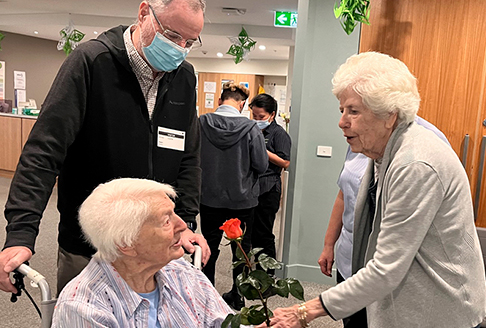Living Well Together launched at Strathalan Residential Aged Care Community
- 07 Dec 2023

Living Well Together, our new model of care, has been officially launched at Baptcare’s Strathalan Residential Aged Care community.
The launch was a wonderful event, with residents and family members given the opportunity to hear from and meet with Baptcare CEO Geraldine Lannon, Chief Operating Officer Silvia Alberti, Baptcare executive leadership team members and Associate Professor Darshini Ayton from Monash University’s Health and Social Care Unit.
Living Well Together (LWT) is also implemented at Brookview community and will be rolled out across all of Baptcare’s residential aged care communities.
This approach has been created in consultation with residents, families and Monash University researchers to better meet the needs of all residents who we care for, including those living with cognitive impairment or dementia.
At the Strathalan launch the meeting area was festooned with green and white decorations, balloons and posters. All decorations were made by residents, with assistance from staff, exemplifying what LWT, Montessori and person-centred care is all about.
Deepti Kaushal, Strathalan’s Residential Care & Services Manager, said the launch was a great event for the whole Strathalan community. “It was spectacular! Residents had a lot of input in decorating the area, and we received a lot of positive feedback from the residents and their families about how LWT has changed their lifestyle and is providing them with an opportunity to do what they were not able to do before.
“LWT is about meaningful activities, not just playing games in groups. It’s more personalised and person-centred. We are giving staff more training and education to understand the importance of having engagement with residents rather than just focusing on their task list.
“It’s about getting to know the residents more deeply. Staff are receiving training to create genuine opportunities for residents to be involved in more meaningful activities they love to do.”
In aged care, models of care define care practices. They guide how aged care services should be delivered, and outline best practice so that residents get the right care at the right time.
LWT focuses on what matters to residents, what is important to them, and what gives them meaning and purpose. It also supports staff by defining the tools, resourcing and training they need to best care for all residents.
Community news
-

Back to School Tips for Foster and Kinship Carers
Heading back to school can be exciting, but it can also bring up big feelings—especially for kids in care. Here are a few simple ways to help make the transition smoother.
- 17 Apr 2025
-

Easter Reflection from Emily Booth of our Spiritual Care Team
A few years ago, at Easter, I was staying with my sister and her family for the weekend. One afternoon we were all sitting around chatting and the kids were playing when my sister came into the room and placed a tray of fresh, warm hot cross buns on the table
- 16 Apr 2025
-

Student Volunteer Spotlight - Erin
Did you know that Baptcare has student volunteers at some of our Residential Aged Care communities? Our volunteers are an integral part of our Baptcare community, not only in residential aged care but across many of our programs and services. Volunteers provide essential connection, positivity and assistance to residents, clients and consumers.
- 04 Apr 2025
